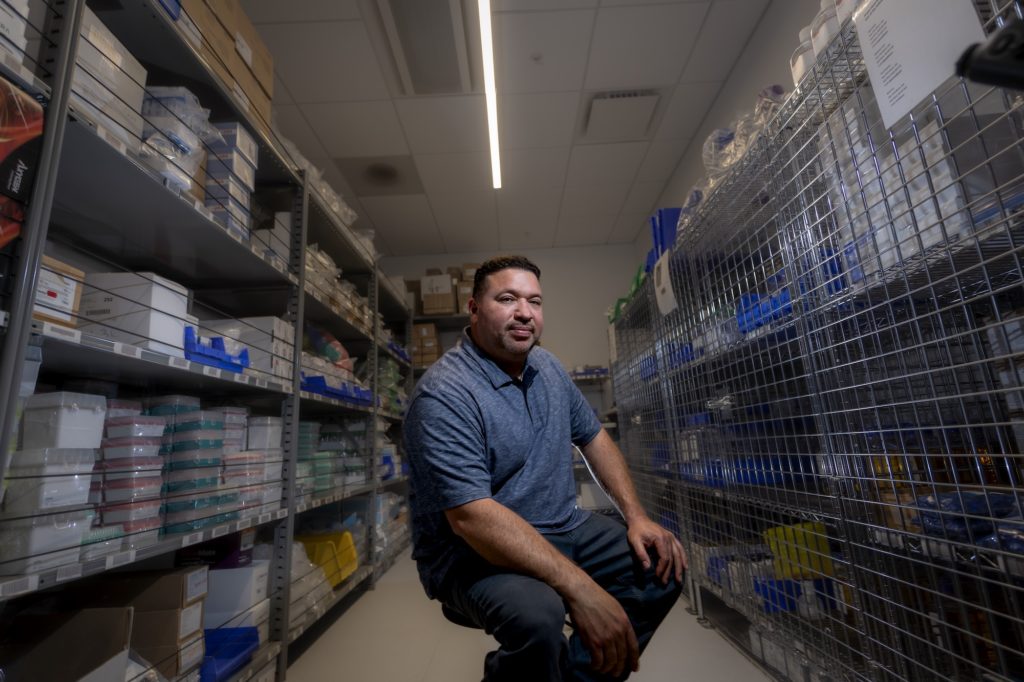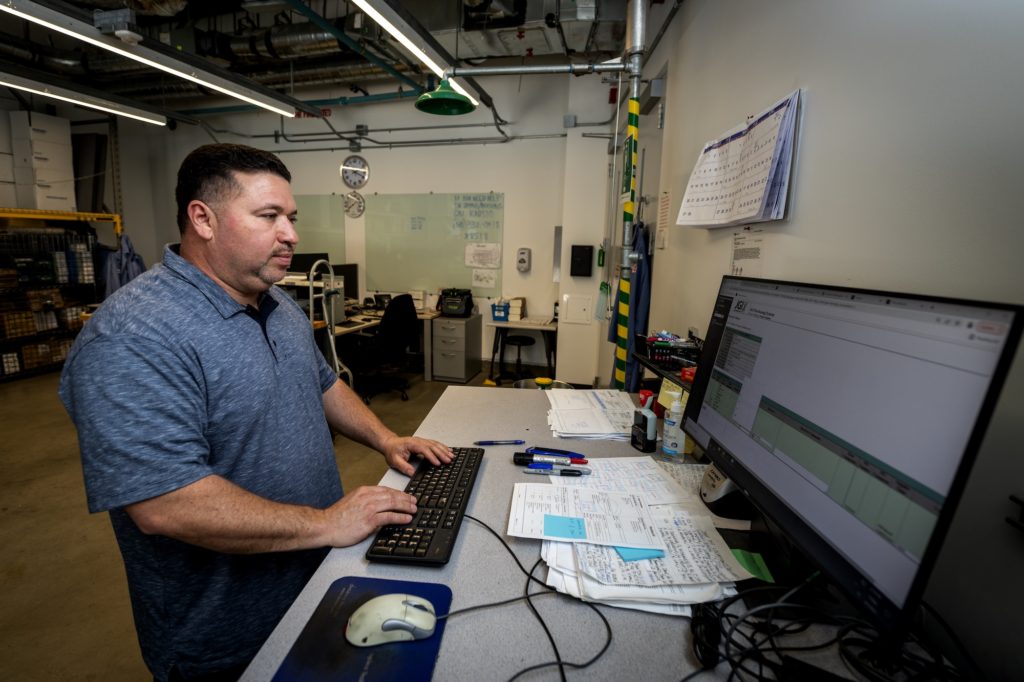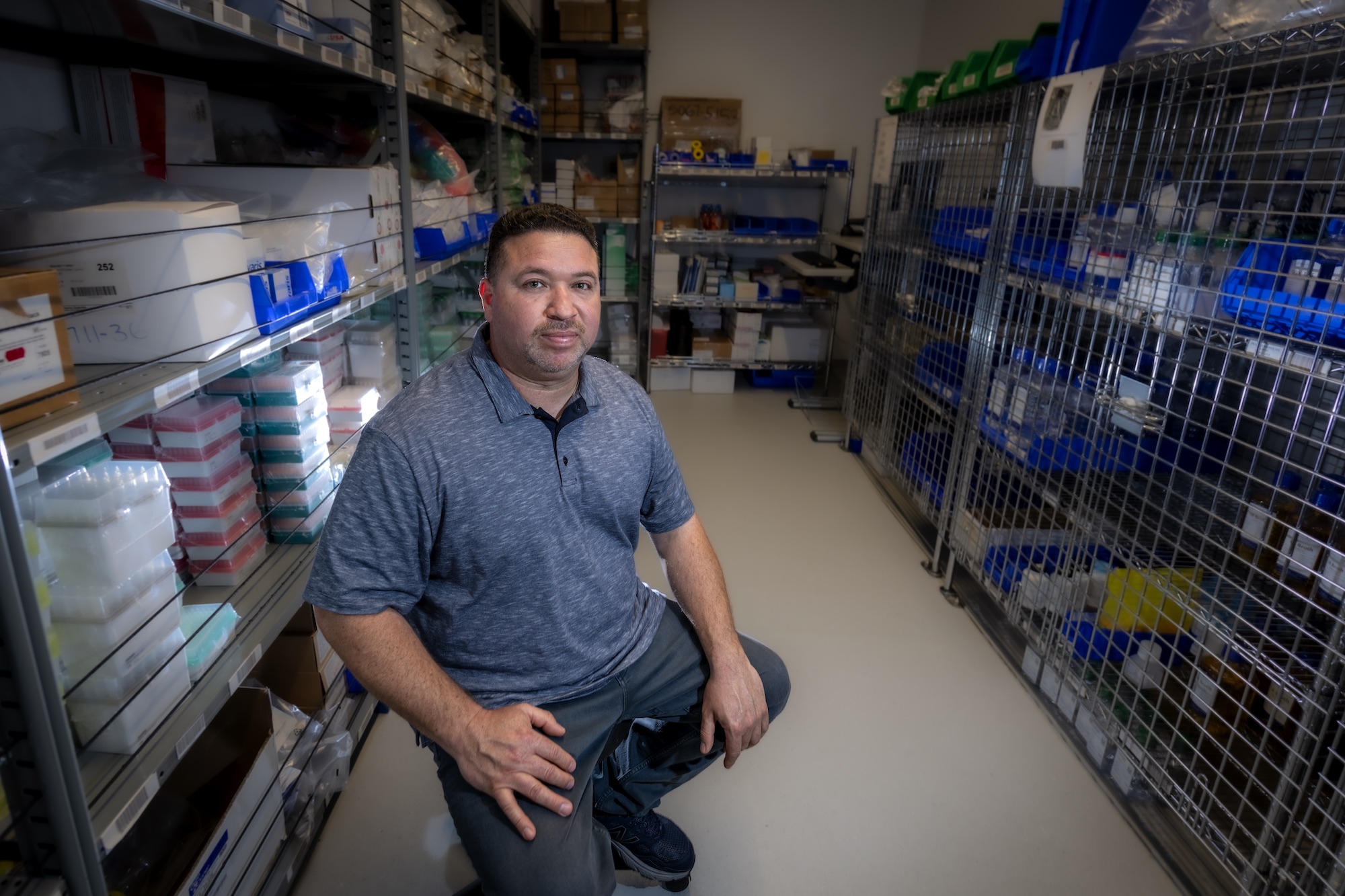When the majority of Berkeley Lab, and a lot of the world, was required to stay home and work remotely during the COVID-19 pandemic, Julio Corral was reporting for work in-person full-time, masked and ready for whatever challenge arose each day of the work week.
As the Property and Distribution Supervisor for the Integrative Genomics Building (IGB), Corral is responsible for keeping track of physical items in the building and equipment that’s been sent out to employees working from home. From laptops and network servers, to chemical reagents and lab equipment, “they all have to be accounted for,” he said.

Corral and his team use inventory-tracking software to keep meticulous tabs on all Lab-procured items, and they regularly conduct building-wide inventories to confirm that everything is in its rightful place. Although maintaining an accurate inventory of each of the barcoded items may seem straightforward, Corral explained that keeping tabs on the physical assets of the nearly 250 individuals who work for the Joint Genome Institute (JGI) often leads down rabbit holes. “It’s really interesting. Sometimes, it feels like I’m on an egg-hunt,” he said, referring to the Easter tradition of hiding eggs for children to find.
Getting Things Done
Due to the nature of his role, Corral was required to be at the IGB throughout the pandemic. Although most people were required to work from home instead of the office or the lab, their shipments and need for DOE-procured equipment didn’t stop. “It was a challenging time, but things needed to get done,” he said.
Within the first few weeks of the stay-at-home orders, an issue with incoming chemical shipments arose. Under normal circumstances, Corral and his team would accept these types of arrivals, log them in the appropriate inventory, and then deliver the item to the addressed desk or lab. “A lot of these shipments were temperature-sensitive items; I knew that I couldn’t just leave it at their desk,” Corral recalled.

He worked with the other operations staff who were onsite at the time to come up with a stopgap. There are many different types of freezers located throughout the IGB, so Corral quickly began inventorying the space that was available and designating which sensitive shipments should go where.
“We’ve never had to do something like that before,” Corral said. “I had to get creative and just figure things out, because there was nobody here [at the IGB].”
Now that the Lab is beginning to transition back to having more staff at worksites, Corral and his team are realizing that this system may make sense to continue into our new normal. Instead of dropping off each new delivery to its owner’s desk and not knowing when that person may be back in the office, they’ll likely keep up the freezer-hoteling approach for the shipments that require being kept at a specific temperature. “It takes the guesswork out of the process,” he said.
Bay Area Roots
As a Bay Area native from East Oakland, Corral grew up with Berkeley Lab in his backyard. These days, most of his extended family continue to live in the area and movie nights at home are a favorite pastime of the pandemic that’s carried into the present.
The month before the COVID-19 shutdown, the Corral family decided to upgrade their family couch. Whether the timing was purely luck or Corral’s keen awareness for tracking and managing assets, they were thankful to have a comfy setup complete with a new popcorn machine when the world shifted towards closure in the spring of 2020.
Aside from time spent with family at home, Corral loves to be spontaneous and jump in the car to explore the hidden gems of the Bay Area. Recently he discovered Locke, a 10-acre unincorporated community that sprung up in the California gold rush era. “There’s so much stuff in cities around us that we don’t even know,” he said.
To the Hill and Back Again
Corral began working at the Lab in 2003 with Central Receiving, the department that receives and distributes all of the mail and shipments that come onsite. When the opportunity arose to transfer to the JGI, then located in Walnut Creek, Corral opted for a change in scenery.
Years later, as JGI prepared for its move to the Lab’s main campus in Berkeley, Corral transitioned to his current role. Between his initial experience working “on the Hill” and his new understanding of the norms at the JGI, Corral enjoyed the chance to help bridge the gap between the two groups.
Within months of JGI settling into their new office and lab spaces at the IGB, nearly all Lab staff were forced to work from home indefinitely. Up until that point, Corral had been working to learn and establish the systems needed to process and track the new building’s physical assets. It was a challenging time before February 2020, but the pandemic “threw a nice wrench into the whole situation,” Corral recalled.
Nevertheless, Corral and his team continued to develop and adapt their tracking systems to accommodate remote office setups while the items necessary to keep IGB experiments running continued to be delivered.
In the early days of spring of 2020, when the Lab campus felt more like a ghost town than a bustling center, the transportation services onsite suddenly stopped. “The drivers weren’t able to come onsite due to the COVID restrictions and packages started to pile up at the main receiving center,” Corral recalled.
For Corral and his team, this was just another day in the pandemic office. Corral called upon his experience and connections still working in Central Receiving and together they hatched a workaround. For the two weeks that the Lab was without the normal shuttles, Corral hopped in his car to do daily pickups from across campus. “It just needed to be done,” he said. “Problem solved.” ⬢
Written by Ashleigh Papp, a communications specialist for Berkeley Lab’s Biosciences Area.
Read other profiles in the Behind the Breakthroughs series.




